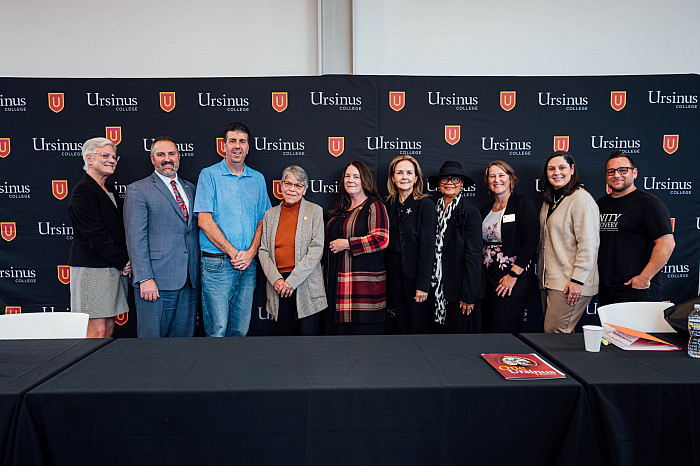A Path Toward Recovery: Rep. Madeleine Dean Leads Panel Discussion at Ursinus
U.S. Rep. Madeleine Dean led a policy panel discussion at Ursinus College on the role higher education institutions can play to destigmatize substance use disorder and how that work assists ongoing initiatives at the federal, state, and local levels.
For many Americans, recovery from substance use disorder is personal.
“If I said, ‘Raise your hand if you know someone in recovery,’ I bet almost every hand in this room would be up,” said the Rev. Dr. Lorina Marshall-Blake, president of the Independence Blue Cross Foundation.
Blake didn’t even have to ask, and she was right. Most of the nearly 70 attendees of a special panel discussion on recovery had their hands up—a reminder of just how close to home it comes for most people.
On Wednesday, November 1, Ursinus College—the nation’s first college or university certified as a Recovery-Friendly Workplace—hosted “Higher Ed’s Role in Community Recovery and Well-being,” an event held in partnership with the office of U.S. Rep. Madeleine Dean. Focused on identifying the ways that higher education could serve as an innovator in the recovery space, the event was attended by members of the Ursinus and Collegeville communities in addition to representatives from elected officials at the local, state, and federal level.
“As a legislator, I am committed to combating the opioid epidemic, breaking the stigma, and supporting more resources for education and prevention,” said Dean, citing her personal ties to recovery.
The congresswoman talked about her son, who battled substance-use disorder and this year is celebrating 11 years in recovery. Yet, while she highlighted her own son’s success, the representative also recognized the countless families still struggling with—and may have even suffered losses in—this battle. She noted the 110,000 people who have lost their lives to overdose in the past 12 months alone.
“Every person should have a chance at recovery, and that’s why I’m happy to be here for this conversation,” Dean said.
Panelists included Marshall-Blake; Kelly Primus, deputy secretary for the Pennsylvania Department of Drug and Alcohol Programs; and Greg Young, director of Recovery-Friendly Workplace—PA Initiative for Unity Recovery. Ursinus Director of Health Promotion Katie Bean served as moderator.
“These are folks that are all around us,” Young said of those going through recovery. “This is something that impacts all of us in one way or another. And I think opening these conversations and getting more comfortable with talking about these issues—looking at it through that humanistic framework—we’re going to try to reduce the exposure to disease.”
One of the central topics of conversation was how higher education institutions like Ursinus can be incubators for recovery-friendly innovation. Dean lauded Ursinus’s status as a Recovery-Friendly Workplace, as well as President Robyn Hannigan’s leadership surrounding a holistic commitment to health and well-being.
“We’re proud of the role that this college campus plays in the national conversation around well-being, and in providing the necessary services for our students, faculty, and staff to thrive,” Hannigan said. “We hope today’s discussion not only informs, but empowers, our guests to take action in supporting the vital work our community and our partners are undertaking every day.”
Marshall-Blake, whose Independence Blue Cross Foundation is at the forefront of not only providing insurance coverage for people in recovery, but also for those who relapse, said collegiate recovery programs reduce the recovery and relapse cycle by 15 years.
“Less than 5 percent of four-year institutions offer this kind of programming,” Marshall-Blake said. “We have to get more of them on board and have them look at your model and others that are out there.”
Taylor Moran, recovery program manager at Saint Joseph’s University, was in attendance and talked about the importance of having all members of a campus community involved in recovery support systems, a sentiment echoed by Primus, who noted, “I’m not even just talking about your professors or adjunct professors. It might be the person in the cafeteria. Anyone can provide intervention because you never know who you’re going to touch.”
Primus added that one of the biggest motivators for those with a substance-use disorder and those in recovery is the power of hope. “It’s one of the greatest gifts we can give,” she said. “These are the people we love. These are our family and friends. And the idea that recovery is possible for everyone—even if it doesn’t happen the first time you get into treatment—is important.”
Dean outlined three key steps to help reduce stigma and better support those in recovery: education about substance use disorder and its risks; prevention; and access to treatment for everyone.
“Our goal in hosting a discussion like this is not to simply highlight the work that our campus has done, but to actually talk to partner organizations who are leading efforts to address the issues that face our communities,” Hannigan said. “There is a path forward. There is an opportunity to support vulnerable members of our community and make sure that they are seen, and they are heard.”
